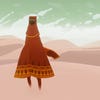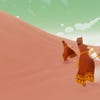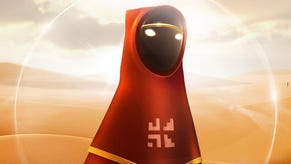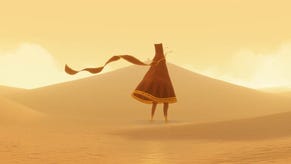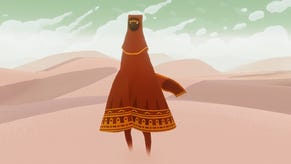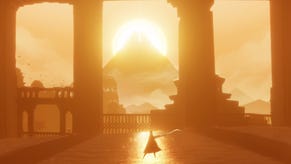A Hero's Journey
Jenova Chen's mission to revolutionise multiplayer.
"We just want to create a more pure environment for more pure, simple communication between the players," Chen notes.
It's a fascinating, refreshing question for a videogame to pose. And one, of course, only an interactive form of entertainment can ask in this way.
My own experience bears this out. Having found another player after days of solitude, I was desperate not to lose my new companion. We ran around in the sand, always keeping an eye on each other, but the other naturally assumed the lead.
After a few minutes, though, the other player's character fell still. Had their game crashed? Had they quit because I wasn't interesting enough to share the moment with? While my brain tied itself in knots of insecure over-analysis, the character suddenly sprang back to life. A phone call? A toilet break? Such uncertainty is the point.
"Because the game is much more about the character itself rather than a weapon or the power they have, I think the bonding between the players will be stronger," says Chen.
"This vast, barren landscape and loneliness will certainly be the feeling if you're playing by yourself. Having a companion then losing them is going to be much, much more intense than losing your teammate in a first-person shooter.
"We really think there will be some new emotion you will experience when playing such an online game."
The multiplayer aspect grew out of a prototype the studio was working on for a 2D game called Dragon. The inspiration for the central theme of Journey, however, is The Hero With A Thousand Faces by Joseph Campbell, an American writer whose works on philosophy and mythology most famously influenced George Lucas when penning the original Star Wars.
"A lot of games are about the hero's journey," says Chen. " To put it simply, the story arc is almost like a story of transformation. The hero doesn't necessarily have to be a person. It could be anything - as long as it's a story of transformation.
"In the past many games have done that," he adds. "But to me what is very interesting is that when you put this hero's journey into a multiplayer game, what happens? Everybody's a hero, everybody's on their way towards a transformation.
"What if two heroes run into each other? People say when you put two different individuals together, they might hate each other, but if you put them together through a very difficult time, afterwards there will be a bond created between the two."
But let's not forget that Journey is a compelling and spectacularly gorgeous experience for the solo player. In terms of sheer overpowering isolation, it's the loneliest game I've played since Shadow Of The Colossus. A comparison Chen enjoys.
"Ueda-san [Fumito Ueda, lead designer of Shadow Of The Colossus developer Team Ico] also said he really liked the atmosphere in Journey," he beams. "I think it's because Shadow of the Colossus and Journey both want to create the sense of awe, a sense of small.
"The land is so large that the character himself is lone and weak and by himself. The feeling is very similar. No wonder a lot of people compare our games. [But] if you look at the core of the game it's quite different: in Shadow Of The Colossus you are empowered as a giant-killer; in Journey you can't kill anything!"


